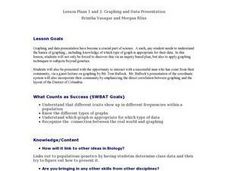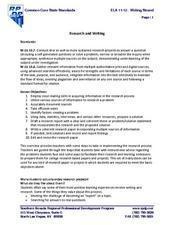Curated OER
What can money tell us?
Students study the physical presence, imagery and written text on a reproduction of colonial currency. They apply their research to a modern day quarter to compare and contrast two coins. In addition, they design their own colonial...
Curated OER
The Origin of Life: Alternative Views
Students explore the topics of faith and science as they relate to the origins of life. They consider the major points of Darwin's Theory of Evolution and brainstorm various explanations of how life began. Students investigate different...
Curated OER
Module 1, Unit 2, Lesson Plan 2: PCR and DNA Diagnosis
High schoolers discuss the importance of the Polymerase Chain Reaction for biologists. They explain what factors make the Polymerase Chain Reaction possible. Students explain the steps in thermocycling and what happens during each step.
Curated OER
Graphing And Data Presentation
High schoolers engage in a study of science and mathematics with the practice of creating graphs. A guest speaker comes to the class to share statistics from the community and the students are shown how he uses the coordinate system in...
Curated OER
Antibiotics: Will They Work?
Students examine why antibiotics are important in everyday life. They examine the decisions that people make and how these decisions can artificially speed up natural selection in bacteria that cause infections such as group A...
Curated OER
HIV Prevention
Seventh graders engage in critical thinking skills about personal health and safety to prevent the acquiring of the HIV disease. The project is an extension of this thinking designed for students to think about all the different ways...
Curated OER
Malaria Introduction
Learners analyze three different strategies for controlling the spread of malaria. They examine the disease and how people catch it. Learners explore the life cycle of the malaria parasite.
Curated OER
Tie Dye
Students practice writing research proposals to test the color fastness of a dye once it has been exposed to a t-shirt. Each proposal needs details of experimental design, length of treatment, and means of cleaning the shirt. All...
Curated OER
Why Are The Shore Birds Dying?
Learners engage in a field study of birds and how they are in danger harm due to environmental factors. They list different possible causes in a prediction activity. The observations are done while writing up data and connecting it to a...
Curated OER
Scientists Write!
Students use a journal to record observations. They make notes about what research may be needed to answer questions that have come up in the field and sketch or make connections in the curriculum. They research bioinformatics and...
Curated OER
Catalase: A Bioinformatics Case Study
Students investigate the physical structure of a protein by using a computer simulation tool. They record its primary amino acid structure while viewing it in three dimensions for a better visual recognition. There is also a comparison...
Curated OER
Who is the Sea Otter Related to?
Learners examine the genetic relationships of different organisms. In groups, they discover the importance of genes and how different amino acids show various evolutionary relationships. They use an online database to continue their...
Curated OER
Seasons and Cloud Cover, Are They Related?
Students use NASA satellite data to see cloud cover over Africa. In this seasons lesson students access data and import it into Excel.
Curated OER
Make a Windmill
Students explore Earth science by conducting an energy experiment in class. In this windmill lesson, students identify how wind has been used to pump water throughout history and the latest developments wind energy has produced. Students...
Curated OER
Wavelengths of Light
Explore physical science by participating in a visual spectrum experiments. Budding scientists identify the colors in the color spectrum and view the colors in class by utilizing cellophane, flash lights, and other arts and crafts...
Curated OER
Animal Keynote Report
Learners produce a research project on an animal. Using the Internet, they find pictures and information about animals. They are also given a list of items that should be covered in their report, including the appearance of the animals,...
Curated OER
Food for thought
Cake has to be good for something, right? Different foods are used by our bodies in different ways. Learners will first read about what fats, proteins, fruits, and vegetables do for the human body. They will then put each of food shown...
Curated OER
Magnets are forceful
You could use this worksheet two different ways. As is, or you could have learners actually do the experiment shown. They are to determine which magnet is strongest by counting the number of paper clips hanging from it. Why not get five...
Curated OER
Non-living Things
Very young scientists circle the things on the worksheet that they think are living things. Most of the pictures are of non-living things. A handy worksheet to use during any initial discussion about living vs. non-living things.
Curated OER
Plants are yummy!
Is it a fruit or a vegetable? Youngsters place an F next to each fruit they see and a V next to the vegetables. Corn is tricky. It is a grass, so it's actually not a fruit or a vegetable, but a grain!
Southern Nevada Regional Professional Development Program
Researching and Writing
Designed for teachers, this resource identifies problems learners face when attempting a research project and approaches instructors can use to help their class members overcome these obstacles. Suggestions are included for how to help...
Curated OER
Night: Guided Imagery Activity
Prior to reading Night, class members engage in a guided imagery activity that helps them make text-to-self connections to Elie Wiesel’s account of his experiences with his father in Auschwitz and Buchenwald. Complete directions, as well...
Concordia University Chicago
The Cradle by Berthe Morisot
The art activities found here have learners take a critical look at the role of women in the domestic setting. They analyze Berthe Morisot's The Cradle through a guided discussion. Then they paint men and women in traditional domestic...
Concordia University Chicago
Liberty Enlightening the World by Frédéric Auguste Bartholdi
Here is a lesson that uses the painting Liberty Enlightening the World to start a discussion on the importance of national monuments. The class discusses several monuments around the world, and then invites a veteran to share his/her...
Other popular searches
- Inquiry Based Learning
- Inquiry Based Cell Biology
- Inquiry Based Physics
- Inquiry Based Science
- Inquiry Based Math
- Inquiry Based Language Arts
- Inquiry Based Math
- Inquiry Based Learning
- Inquiry Based Instrumental
- Inquiry Based Learning Maths
- Inquiry Based Science
- Inquiry Based Physics Motion

























